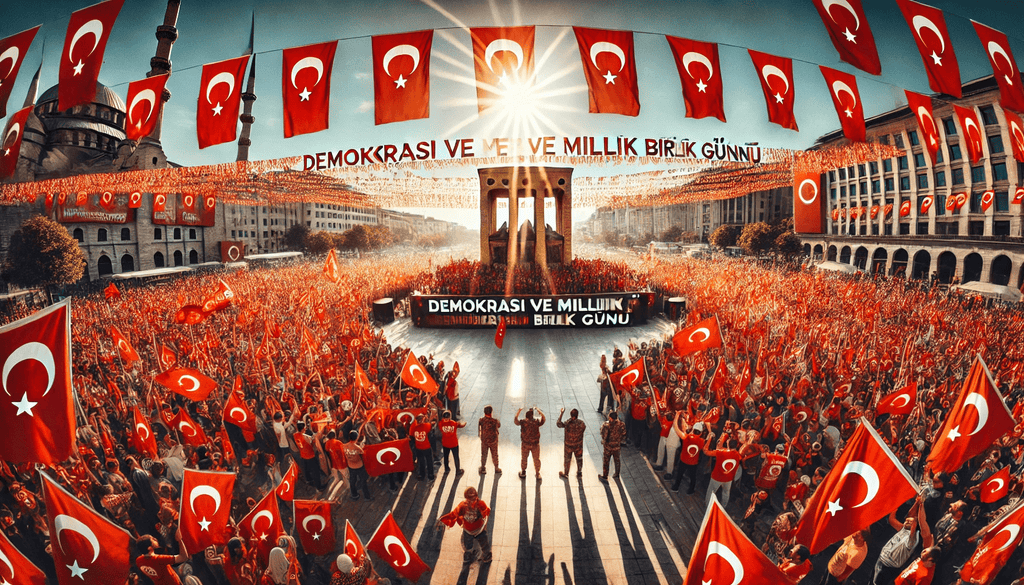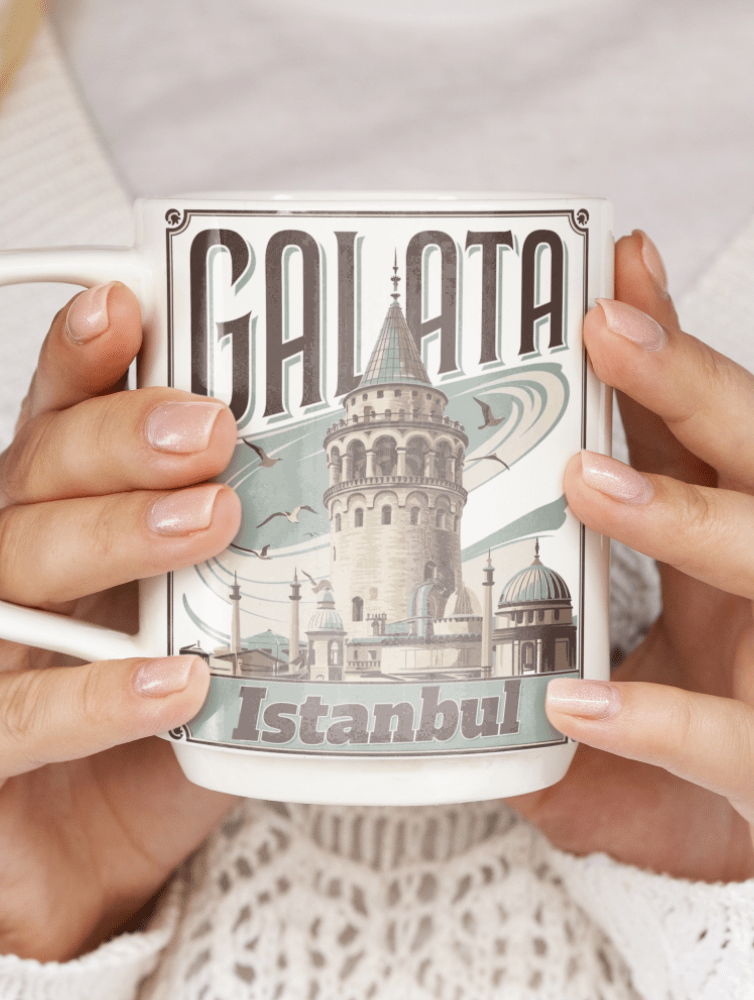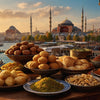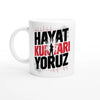Demokrasi ve Millî Birlik Günü: Your Ultimate Guide to Turkey's Holiday

Hello and welcome to your comprehensive blog post about one of the most important holidays in Turkey: Demokrasi ve Millî Birlik Günü, which translates to "Day of Democracy and National Unity". If you're wondering what this special day is all about, why it's so important in Turkey, and how it's celebrated, then you've come to the right place!
In this extensive article, we'll take you on a journey through the history and significance of this holiday. We will explore the background, explain the central messages, and show you how the Turkish people observe this day. And don't worry, we're writing in a relaxed and understandable style, as if we were chatting in person. So, make yourself comfortable and dive into the world of Demokrasi ve Millî Birlik Günü with us!
What awaits you in this blog post:
- What exactly is Demokrasi ve Millî Birlik Günü? – An easy-to-understand explanation of the holiday.
- The Dark Day: The Coup Attempt of July 15, 2016 – We will look at the historical events that led to this holiday.
- Why do Turks celebrate Demokrasi ve Millî Birlik Günü? – The meaning and purpose of the holiday.
- "Democracy and National Unity" – What's behind the name? – We analyze the central concepts of the holiday.
- How is Demokrasi ve Millî Birlik Günü celebrated in Turkey? – Traditions, ceremonies, and commemorations.
- The Symbols of the Holiday – Flags, monuments, and other signs of remembrance.
- Critical Voices and Controversies – A look at the shadows and different perspectives.
- Demokrasi ve Millî Birlik Günü Over Time – How the holiday has evolved and what its future holds.
- Your Conclusion: Why this holiday might be interesting for you too.
- FAQ – Frequently Asked Questions – Answers to the most important questions about the holiday.
And that's not all! We've designed this blog post to be not only informative but also to rank high on Google. Because when you search for "Demokrasi ve Millî Birlik Günü," "Turkish Holiday," "Holiday Turkey," or similar terms, we want you to find us! So, let's get started and discover this important holiday together!
What exactly is Demokrasi ve Millî Birlik Günü?
Imagine a day when an entire country comes together to celebrate something very special: democracy and national unity. That is precisely what Demokrasi ve Millî Birlik Günü is in Turkey. This holiday, observed every year on July 15th, is more than just a day off. It is a symbol of the solidarity of the Turkish people and their determination to defend democracy.
But why July 15th specifically? And what exactly is being celebrated? To understand this, we need to delve a little into history, specifically the summer of 2016.
The Dark Day: The Coup Attempt of July 15, 2016
July 15, 2016, was destined to be a day that would forever change Turkey. On this evening, a group within the Turkish military attempted to seize power in the state. It was a coup attempt that shook the country to its foundations.
What exactly happened that evening? Soldiers affiliated with the network of preacher Fethullah Gülen (designated as "FETÖ" – Fetullahist Terrorist Organization – by the Turkish government) occupied strategic locations in Ankara and Istanbul. They deployed tanks onto the streets, blocked bridges, and tried to gain control of key institutions.
The coup plotters attacked the Parliament in Ankara, opened fire on civilians, and even tried to arrest President Erdoğan. These were chaotic and fearful hours, during which many people in Turkey worried about the future of their country.
But what happened next was remarkable. Contrary to the expectations of the coup plotters, the Turkish people stood united against the coup attempt. Following a call from President Erdoğan, hundreds of thousands of people took to the streets to confront the coup plotters. They blocked tanks, resisted soldiers, and demonstrated incredible courage and determination.
In the early morning hours of July 16th, the coup attempt finally failed. Thanks to the resistance of the people, the loyalty of large parts of the military and police, and the determination of the political leadership, democracy in Turkey was saved. However, the coup attempt came at a high price: over 250 people were killed and more than 2,000 injured.
Why do Turks celebrate Demokrasi ve Millî Birlik Günü?
After the failed coup attempt, it quickly became clear that this day should not be forgotten. The Turkish government under President Erdoğan decided to declare July 15th a national holiday – as Demokrasi ve Millî Birlik Günü.
But why this holiday? What is its purpose? There are several important reasons:
- Commemoration of the Victims: Demokrasi ve Millî Birlik Günü is first and foremost a day of remembrance for the people who lost their lives during the coup attempt. These are the "Martyrs of Democracy," as they are called in Turkey. Commemorative events are held every year in their honor.
- Honoring the Resistance: The holiday also honors the courageous resistance of the Turkish people against the coup attempt. It recalls that it was the citizens who saved democracy through their efforts. It is a day of pride in the solidarity and determination of the people.
- Strengthening Democracy: Demokrasi ve Millî Birlik Günü is intended to strengthen awareness of the importance of democracy. It aims to remind people how valuable democratic values and institutions are and how important it is to defend them.
- Promoting National Unity: The name of the holiday, "Day of Democracy and National Unity," also emphasizes the importance of national unity. After the turbulent events of the coup attempt, the holiday is meant to help reconcile society and strengthen cohesion in the country.
-
Warning Against Dangers to Democracy: Finally, Demokrasi ve Millî Birlik Günü is also a warning. It serves as a reminder that democracy can always be under threat and that it is important to be vigilant and stand against all forms of undemocratic aspirations.

"Democracy and National Unity" – What's behind the name?
The name "Demokrasi ve Millî Birlik Günü" is programmatic. It combines two central concepts that are of great importance in the context of the holiday: Democracy and National Unity. But what do these terms mean exactly in this context?
- Democracy: At its core, Demokrasi ve Millî Birlik Günü is about defending democracy in Turkey. The coup attempt of July 15, 2016, was perceived as a direct attack on the democratic order of the country. The citizens who opposed the coup saw themselves as defenders of democracy. The holiday is intended to honor this commitment and reaffirm the commitment to democracy as a form of government. This is about more than just elections and parliaments. It is about fundamental democratic values such as the rule of law, freedom of speech, human rights, and respect for diversity.
- National Unity: The second part of the name, "National Unity," emphasizes the importance of cohesion in Turkish society. The coup attempt had opened deep rifts and polarized society. Demokrasi ve Millî Birlik Günü is intended to help overcome these rifts and strengthen the unity of the country. This involves a sense of belonging together across political, ethnic, and religious differences. It is about a common commitment to Turkey as a homeland and the willingness to stand up for the country together. "National Unity" in this context is often seen as a response to attempts at division and external threats.
Together, "Democracy" and "National Unity" form the core message of Demokrasi ve Millî Birlik Günü. It emphasizes that democracy and national cohesion are inextricably linked and that both are equally important for the future of Turkey.
How is Demokrasi ve Millî Birlik Günü celebrated in Turkey?
Demokrasi ve Millî Birlik Günü is a national holiday, which means that various events and ceremonies take place throughout Turkey. How is this day typically observed?
- Commemorations for the Victims: A central component of the holiday are commemorations for the victims of the coup attempt. In many cities, there are memorials and memorial sites where wreaths are laid and speeches are given. Particularly moving are often the ceremonies where the names of the "Martyrs of Democracy" are read out. Relatives of the victims play an important role at these events.
- Speeches and Addresses by Politicians: As is customary with many national holidays, there are also numerous speeches and addresses by politicians on Demokrasi ve Millî Birlik Günü. President Erdoğan usually delivers a nationwide speech in which he emphasizes the significance of the holiday and recalls the events of 2016. Other government officials, members of parliament, and local politicians also use the day to speak out. Their speeches often revolve around the themes of democracy, national unity, resilience, and defense against threats.
- Public Demonstrations and Rallies: In many cities, public demonstrations and rallies take place where citizens express their support for democracy and national unity. Turkish flags are often waved and patriotic songs are sung. These events are often characterized by a strong sense of national solidarity.
- Cultural Events: In addition to the official ceremonies, there are also numerous cultural events surrounding Demokrasi ve Millî Birlik Günü. Concerts, theater performances, exhibitions, and film screenings aim to convey the messages of the holiday in an artistic way. Historical references to the Turkish War of Independence and other important moments in national history are often made.
- Torchlight Processions and Prayer Ceremonies: In some regions, there are evening torchlight processions where people march through the streets with torches or candles to commemorate the victims. Prayer ceremonies in mosques and other religious institutions are also part of the celebrations. The religious aspect plays an important role in Turkish society, and religious rituals also find their place within Demokrasi ve Millî Birlik Günü.
- Educational Programs: Especially for young people, it is important to understand the background of Demokrasi ve Millî Birlik Günü. Therefore, there are special lessons, lectures, and projects in schools and universities that deal with the coup attempt of 2016 and the importance of democracy and national unity. The media also offer numerous information services and documentaries on this topic.
The Symbols of the Holiday
Like any important holiday, Demokrasi ve Millî Birlik Günü also has certain symbols that appear repeatedly and visually reinforce the messages of the day. What are these symbols?
- The Turkish Flag (Türk Bayrağı): The Turkish flag is probably the most important symbol of the holiday. It stands for the nation, unity, and the pride of the Turks. On Demokrasi ve Millî Birlik Günü, Turkish flags are hoisted everywhere in the country, on public buildings, residential houses, and in the streets. Flags play a central role in demonstrations and rallies. The red color of the flag recalls the blood of the martyrs, while the crescent moon and star are traditional Islamic symbols.
- The 15 July Martyrs' Monument (15 Temmuz Şehitler Anıtı): In Ankara, there is a central monument dedicated to the victims of the coup attempt: the 15 Temmuz Şehitler Anıtı. This monument is an important place for commemorations and symbolizes the recognition and respect for the "Martyrs of Democracy." Similar monuments and memorials exist in other cities as well.
- The Crescent Moon and Star: In addition to the flag itself, the crescent moon and star, which are central elements of the flag, are important symbols. They stand not only for Islam but also for Turkish identity and culture. On Demokrasi ve Millî Birlik Günü, these symbols are often emphasized, for example in logos, posters, and decorations.
- The Color Red: The color red, which dominates the Turkish flag, is also an important symbol. It stands for patriotism, willingness to sacrifice, and the blood of the martyrs. On Demokrasi ve Millî Birlik Günü, the color red is often used to express solidarity with the country and the victims of the coup attempt.
- Pictures of President Erdoğan: President Erdoğan plays a central role in the narrative surrounding the failed coup attempt and Demokrasi ve Millî Birlik Günü. He is often portrayed as the one who led the country through this crisis and called for unity. Therefore, pictures of President Erdoğan are often present on this day, for example on posters and in media reports.
It is important to understand that these symbols have deep emotional significance for many Turks. They are expressions of national pride, mourning for the victims, and commitment to democracy and national unity.
Critical Voices and Controversies
As important as Demokrasi ve Millî Birlik Günü is for many people in Turkey, there are also critical voices and controversies surrounding this holiday. It is important to consider these perspectives as well to get a complete picture.
- Criticism of the Official Account of the Coup Attempt: Not all observers share the official account of the coup attempt of July 15, 2016. There are doubts about the background and the exact role of various actors. Some critics accuse the government of instrumentalizing the coup attempt for its own purposes and persecuting political opponents. However, these critical voices are often suppressed in Turkey or defamed as "terrorist propaganda."
- Instrumentalization of the Holiday for Political Purposes: Another point of criticism is that Demokrasi ve Millî Birlik Günü is instrumentalized by the ruling AKP party and its supporters for political purposes. Critics see the holiday as a means of consolidating their own power, fueling nationalism, and marginalizing dissidents. The celebrations are often perceived as overly nationalistic and state-centric.
- Marginalization of Certain Population Groups: Some population groups in Turkey do not feel represented or even feel marginalized on Demokrasi ve Millî Birlik Günü. This particularly affects Kurds, Alevis, and secular people who cannot identify with the official policies of the ruling AKP party. They see the holiday more as a symbol of division than unity.
- Relationship to Democracy in Turkey: Ironically, Demokrasi ve Millî Birlik Günü is perceived by critics of the Turkish government as a holiday of a "restricted democracy." They argue that democracy in Turkey has been weakened rather than strengthened since the coup attempt. The persecution of journalists, opposition figures, and critics, the restriction of freedom of expression, and the weakening of the rule of law are seen as signs of this. These critics lament that while the holiday invokes democracy, the reality in Turkey often looks different.
- Lack of Thorough Investigation of Events: Another point of criticism is that the events of the coup attempt and the associated human rights violations have not been comprehensively investigated to this day. Many questions remain open, and those responsible for certain crimes have not been held accountable. Critics are calling for an independent investigation of the events and a transparent clarification.
It is important to note that these critical voices are often marginalized in Turkey and are hardly heard in the mainstream media. Nevertheless, they are part of the reality and should not be ignored in a comprehensive consideration of Demokrasi ve Millî Birlik Günü.
Demokrasi ve Millî Birlik Günü Over Time
Demokrasi ve Millî Birlik Günü is a relatively young holiday. It was only established after the coup attempt of 2016. How has the holiday evolved since then, and what future does it have?
- Establishment as a Fixed Part of the Turkish Holiday Calendar: In the few years since its introduction, Demokrasi ve Millî Birlik Günü has established itself as a fixed part of the Turkish holiday calendar. It is observed every year and has become an important date for many Turks. The significance of the holiday is repeatedly emphasized by the government and the mainstream media.
- Rituals and Traditions are Developing: Although Demokrasi ve Millî Birlik Günü is still young, certain rituals and traditions are already developing around the holiday. Commemorations, speeches, demonstrations, cultural events – all of this contributes to giving the holiday a fixed form and anchoring it in collective memory.
- Strengthening of Nationalistic Tones: In recent years, there has been a tendency to strengthen nationalistic tones on Demokrasi ve Millî Birlik Günü. The holiday is increasingly used to demonstrate national unity and strength and to demarcate against external and internal "enemies." This development is viewed with concern by critics, as they fear further polarization of society.
- Possible Changes in the Future: How Demokrasi ve Millî Birlik Günü will continue to develop in the future is difficult to predict. Much depends on the political development in Turkey. It is conceivable that the focus of the holiday will shift over time, depending on which political and social challenges are at the forefront. A change of government could also have an impact on the design and significance of the holiday.
- Significance for Future Generations: An important question is what significance Demokrasi ve Millî Birlik Günü will have for future generations. Will they find the holiday as important as the older generations who experienced the coup attempt themselves? Or will the memory of the events of 2016 fade over time? The answer to this question will depend on how successful efforts are to keep the messages of the holiday alive and convey them to young people.
Your Conclusion: Why this holiday might be interesting for you too
You may now be wondering why Demokrasi ve Millî Birlik Günü should also be interesting for you if you do not live in Turkey or have Turkish roots. There are good reasons for this:
- Insight into Turkish Society and Politics: Demokrasi ve Millî Birlik Günü offers you a deep insight into Turkish society and politics. It shows you which values are important in Turkey, which challenges the country has to overcome, and how people there deal with crises.
- Understanding the Importance of Democracy and National Unity: Even if you are not directly affected by the events in Turkey, Demokrasi ve Millî Birlik Günü reminds you how important democracy and national cohesion are – everywhere in the world. It urges vigilance against undemocratic tendencies and to defend democratic values.
- Stimulus for Reflection on Your Own Values: Demokrasi ve Millî Birlik Günü can also encourage you to reflect on your own values and beliefs. What does democracy mean to you? How important is national cohesion in your country? How would you behave in a crisis?
- Intercultural Exchange and Dialogue: By engaging with Demokrasi ve Millî Birlik Günü, you open yourself up to intercultural exchange and dialogue. You get to know another culture and perspective and can break down prejudices and misunderstandings.
- Relevance to Global Politics: The events in Turkey in the summer of 2016 and the reactions to them also have a global dimension. They show how fragile democracies can be and how important international solidarity and cooperation are to protect democratic values worldwide.
In short, Demokrasi ve Millî Birlik Günü is more than just a Turkish holiday. It is a window into another culture, a reminder to be vigilant, and a stimulus for reflection. It is worth engaging with it – no matter where you come from and where you live.
FAQ – Frequently Asked Questions
Finally, we will answer some frequently asked questions about Demokrasi ve Millî Birlik Günü:
- Is Demokrasi ve Millî Birlik Günü a religious holiday? No, Demokrasi ve Millî Birlik Günü is not a religious holiday, but a national holiday that commemorates a political event – the failed coup attempt of July 15, 2016. However, religious elements, especially Islamic prayers, play a role in the celebrations because the majority of the Turkish population is Muslim.
- Do all Turks agree with Demokrasi ve Millî Birlik Günü? No, there are also critical voices and controversies surrounding Demokrasi ve Millî Birlik Günü (see section "Critical Voices and Controversies"). Not all Turks share the official interpretation of the holiday or the policies of the ruling AKP party.
- Are there special traditions for eating on Demokrasi ve Millî Birlik Günü? No, there are no specific culinary traditions associated with Demokrasi ve Millî Birlik Günü. It is a day of remembrance and political demonstration, not so much a family celebration like Eid al-Fitr or Eid al-Adha.
- Can tourists participate in the Demokrasi ve Millî Birlik Günü celebrations? Yes, tourists are generally welcome to participate in public events and commemorations that take place as part of Demokrasi ve Millî Birlik Günü. It is a good opportunity to get to know Turkish culture and society better. However, you should behave respectfully and adapt to local customs.
- Where can I find more information about Demokrasi ve Millî Birlik Günü? There are numerous online resources, news articles, documentaries, and scholarly works on Demokrasi ve Millî Birlik Günü and the coup attempt of July 15, 2016. Turkish embassies and consulates abroad can also provide information.
We hope you enjoyed this post and that it has helped you to better understand Demokrasi ve Millî Birlik Günü. If you have any further questions or suggestions, please leave a comment! And don't forget to share this blog post with your friends and acquaintances so that they too can learn more about this interesting holiday. Thank you for reading and until next time!
Visit our shop with Fantaschite patriotic designs
-
Posted in
Patriotic





